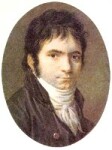 In 1792 he moved permanently to the city of Vienna, where he took lessons from various musicians, including the already famous Haydn. By 1795 Beethoven had become a well recognized pianist, admired in particular for his brilliant improvisations, and some of his compositions had been published. He was sponsored by various members of the nobility, who supported him while he worked; during the next few years he produced the piano sonatas 'Pathetique' and 'Moonlight'. These years also saw the composition of his first three piano concertos, his first two symphonies, and a set of six string quartets. By 1809, he was being paid an annual salary by the nobility of Vienna, on the condition that he continue to compose and play his music there. In 1792 he moved permanently to the city of Vienna, where he took lessons from various musicians, including the already famous Haydn. By 1795 Beethoven had become a well recognized pianist, admired in particular for his brilliant improvisations, and some of his compositions had been published. He was sponsored by various members of the nobility, who supported him while he worked; during the next few years he produced the piano sonatas 'Pathetique' and 'Moonlight'. These years also saw the composition of his first three piano concertos, his first two symphonies, and a set of six string quartets. By 1809, he was being paid an annual salary by the nobility of Vienna, on the condition that he continue to compose and play his music there.Beethoven had always been fascinated by the piano, but early in his career he had noticed that his hearing was not perfect. Over the next decade he continued to produce exciting and masterful works of music, including his symphonies numbers three through eight, piano concertos, and a lot of chamber music. But he grew more and more depressed as he realized that his hearing disorder was permanent, and slowly getting worse. The world's greatest composer and pianist was going deaf!  Beethoven stopped playing public performances, and concentrated on composing. He produced some of his best works, which included his famous Choral Symphony no.9 in D Minor, which became the basis of Schiller's 'Ode to Joy'. But his hearing was nearly gone, and what sounds he could hear were distorted. Nevertheless, he continued to compose works of music which would be acknowledged for centuries as masterpieces! In his private life, he became short-tempered, and avoided company, remaining alone much of the time to keep others from learning that he was nearly deaf . In a letter to a friend, he wrote: "How can I, a musician, say to people 'I am deaf!'? I shall, if I can, defy this fate, even though there will be times when I shall be the unhappiest of God's creatures ... I live only in music ... frequently working on three or four pieces simultaneously".By 1820 he was able to communicate with visitors and trusted friends only in writing. During much of his later life, he was troubled by illness, but his reputation was not diminished. When he died in 1827, ten thousand people or more are said to have attended the funeral. He had become a public figure, as no composer had been before. Beethoven was ill for most of his life after about the age of twenty. He suffered from stomache aches, digestive problems, depression and irritability. Using a lock of his hair recently discovered in Beethoven memorabilia, scientists have determined that he was actually a victim of lead poisoning! His body contained over a hundred times the amount of lead an average person would have today. It is suggested that he drank often from lead mugs, or that perhaps his house contained lead water pipes. |